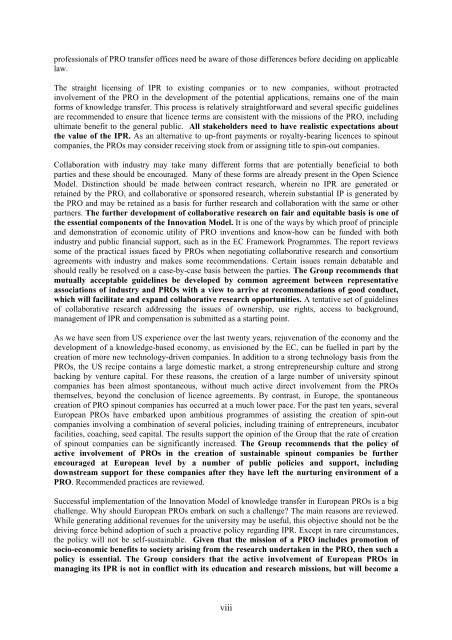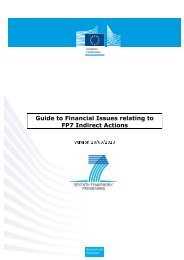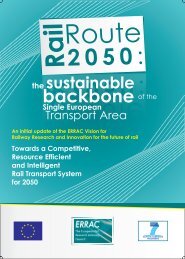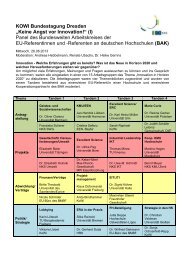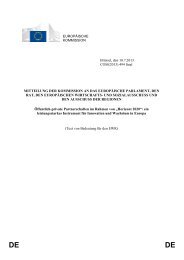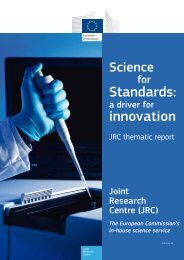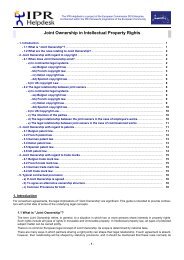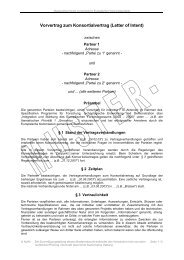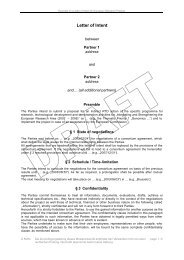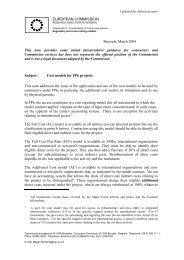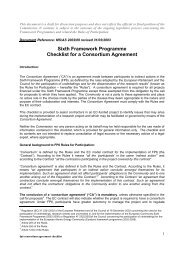Expert Group Report Management of Intellectual Property in ... - KoWi
Expert Group Report Management of Intellectual Property in ... - KoWi
Expert Group Report Management of Intellectual Property in ... - KoWi
Create successful ePaper yourself
Turn your PDF publications into a flip-book with our unique Google optimized e-Paper software.
pr<strong>of</strong>essionals <strong>of</strong> PRO transfer <strong>of</strong>fices need be aware <strong>of</strong> those differences before decid<strong>in</strong>g on applicable<br />
law.<br />
The straight licens<strong>in</strong>g <strong>of</strong> IPR to exist<strong>in</strong>g companies or to new companies, without protracted<br />
<strong>in</strong>volvement <strong>of</strong> the PRO <strong>in</strong> the development <strong>of</strong> the potential applications, rema<strong>in</strong>s one <strong>of</strong> the ma<strong>in</strong><br />
forms <strong>of</strong> knowledge transfer. This process is relatively straightforward and several specific guidel<strong>in</strong>es<br />
are recommended to ensure that licence terms are consistent with the missions <strong>of</strong> the PRO, <strong>in</strong>clud<strong>in</strong>g<br />
ultimate benefit to the general public. All stakeholders need to have realistic expectations about<br />
the value <strong>of</strong> the IPR. As an alternative to up-front payments or royalty-bear<strong>in</strong>g licences to sp<strong>in</strong>out<br />
companies, the PROs may consider receiv<strong>in</strong>g stock from or assign<strong>in</strong>g title to sp<strong>in</strong>-out companies.<br />
Collaboration with <strong>in</strong>dustry may take many different forms that are potentially beneficial to both<br />
parties and these should be encouraged. Many <strong>of</strong> these forms are already present <strong>in</strong> the Open Science<br />
Model. Dist<strong>in</strong>ction should be made between contract research, where<strong>in</strong> no IPR are generated or<br />
reta<strong>in</strong>ed by the PRO, and collaborative or sponsored research, where<strong>in</strong> substantial IP is generated by<br />
the PRO and may be reta<strong>in</strong>ed as a basis for further research and collaboration with the same or other<br />
partners. The further development <strong>of</strong> collaborative research on fair and equitable basis is one <strong>of</strong><br />
the essential components <strong>of</strong> the Innovation Model. It is one <strong>of</strong> the ways by which pro<strong>of</strong> <strong>of</strong> pr<strong>in</strong>ciple<br />
and demonstration <strong>of</strong> economic utility <strong>of</strong> PRO <strong>in</strong>ventions and know-how can be funded with both<br />
<strong>in</strong>dustry and public f<strong>in</strong>ancial support, such as <strong>in</strong> the EC Framework Programmes. The report reviews<br />
some <strong>of</strong> the practical issues faced by PROs when negotiat<strong>in</strong>g collaborative research and consortium<br />
agreements with <strong>in</strong>dustry and makes some recommendations. Certa<strong>in</strong> issues rema<strong>in</strong> debatable and<br />
should really be resolved on a case-by-case basis between the parties. The <strong>Group</strong> recommends that<br />
mutually acceptable guidel<strong>in</strong>es be developed by common agreement between representative<br />
associations <strong>of</strong> <strong>in</strong>dustry and PROs with a view to arrive at recommendations <strong>of</strong> good conduct,<br />
which will facilitate and expand collaborative research opportunities. A tentative set <strong>of</strong> guidel<strong>in</strong>es<br />
<strong>of</strong> collaborative research address<strong>in</strong>g the issues <strong>of</strong> ownership, use rights, access to background,<br />
management <strong>of</strong> IPR and compensation is submitted as a start<strong>in</strong>g po<strong>in</strong>t.<br />
As we have seen from US experience over the last twenty years, rejuvenation <strong>of</strong> the economy and the<br />
development <strong>of</strong> a knowledge-based economy, as envisioned by the EC, can be fuelled <strong>in</strong> part by the<br />
creation <strong>of</strong> more new technology-driven companies. In addition to a strong technology basis from the<br />
PROs, the US recipe conta<strong>in</strong>s a large domestic market, a strong entrepreneurship culture and strong<br />
back<strong>in</strong>g by venture capital. For these reasons, the creation <strong>of</strong> a large number <strong>of</strong> university sp<strong>in</strong>out<br />
companies has been almost spontaneous, without much active direct <strong>in</strong>volvement from the PROs<br />
themselves, beyond the conclusion <strong>of</strong> licence agreements. By contrast, <strong>in</strong> Europe, the spontaneous<br />
creation <strong>of</strong> PRO sp<strong>in</strong>out companies has occurred at a much lower pace. For the past ten years, several<br />
European PROs have embarked upon ambitious programmes <strong>of</strong> assist<strong>in</strong>g the creation <strong>of</strong> sp<strong>in</strong>-out<br />
companies <strong>in</strong>volv<strong>in</strong>g a comb<strong>in</strong>ation <strong>of</strong> several policies, <strong>in</strong>clud<strong>in</strong>g tra<strong>in</strong><strong>in</strong>g <strong>of</strong> entrepreneurs, <strong>in</strong>cubator<br />
facilities, coach<strong>in</strong>g, seed capital. The results support the op<strong>in</strong>ion <strong>of</strong> the <strong>Group</strong> that the rate <strong>of</strong> creation<br />
<strong>of</strong> sp<strong>in</strong>out companies can be significantly <strong>in</strong>creased. The <strong>Group</strong> recommends that the policy <strong>of</strong><br />
active <strong>in</strong>volvement <strong>of</strong> PROs <strong>in</strong> the creation <strong>of</strong> susta<strong>in</strong>able sp<strong>in</strong>out companies be further<br />
encouraged at European level by a number <strong>of</strong> public policies and support, <strong>in</strong>clud<strong>in</strong>g<br />
downstream support for these companies after they have left the nurtur<strong>in</strong>g environment <strong>of</strong> a<br />
PRO. Recommended practices are reviewed.<br />
Successful implementation <strong>of</strong> the Innovation Model <strong>of</strong> knowledge transfer <strong>in</strong> European PROs is a big<br />
challenge. Why should European PROs embark on such a challenge? The ma<strong>in</strong> reasons are reviewed.<br />
While generat<strong>in</strong>g additional revenues for the university may be useful, this objective should not be the<br />
driv<strong>in</strong>g force beh<strong>in</strong>d adoption <strong>of</strong> such a proactive policy regard<strong>in</strong>g IPR. Except <strong>in</strong> rare circumstances,<br />
the policy will not be self-susta<strong>in</strong>able. Given that the mission <strong>of</strong> a PRO <strong>in</strong>cludes promotion <strong>of</strong><br />
socio-economic benefits to society aris<strong>in</strong>g from the research undertaken <strong>in</strong> the PRO, then such a<br />
policy is essential. The <strong>Group</strong> considers that the active <strong>in</strong>volvement <strong>of</strong> European PROs <strong>in</strong><br />
manag<strong>in</strong>g its IPR is not <strong>in</strong> conflict with its education and research missions, but will become a<br />
viii


